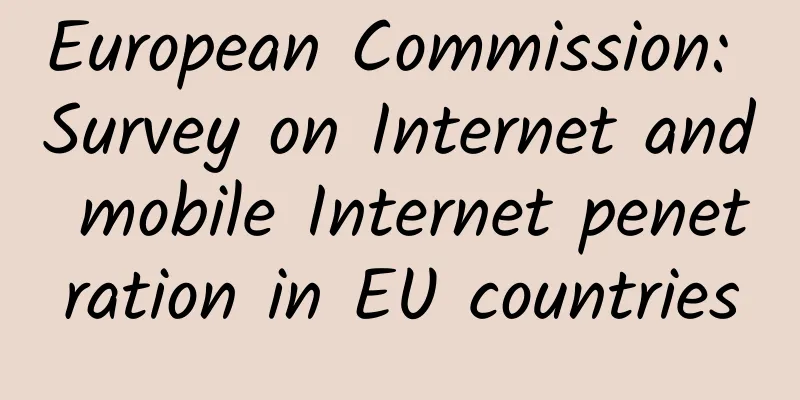European Commission: Survey on Internet and mobile Internet penetration in EU countries

|
199IT original compilation The European Commission recently published a report on the digital performance of EU member states, which found that: Mobile phones are the main communication service in Europe More than 9/10 respondents use mobile phones to make or receive calls (93%), 75% of respondents send or receive text messages, 7/10 respondents send emails (69%), 67% of respondents use landlines to make or receive calls, and more than half of the respondents use Internet communication services (53%); 62% of Europeans make or receive multiple calls on their mobile phones every day, with at least 60% of people using mobile phones every day in every member state; Answering or making calls on mobile phones and sending and receiving text messages were the most common communication activities across all age groups; There is a generational gap between new and more established communication services, with 44% of 15-24 year olds posting on social media daily, compared to only 18% of 40-54 year olds and 5% of those aged 55 and over. What is more obvious is that there are greater differences in social network usage between European countries, and there are smaller differences in social network usage among young people in different countries; Mobile phone is the most commonly used daily communication service (74%), followed by mobile internet (34%) and fixed-line phone (32%). At least two-thirds of respondents in each member state say mobile phone is the most important service, while Internet connection (52%) and Internet communication services (46%) are also the most important services in daily life for half of Europeans. The most important services in daily life also vary among different age groups. Respondents aged 15 to 24 believe that Internet communication services are the most important (66%), while only 26% of respondents aged 55 and above agree. There is also a generation gap in attitudes towards mobile Internet. 62% of respondents aged 15 to 24 believe that mobile Internet is important, while only 12% of respondents aged 55 and above think so. One-third of European Internet users use at least one paid Internet service (32%), with music (14%) or film and documentary services (12%) being the most common. There are also large differences in the use of paid services by country, with Swedes using them the most (69%) and Lithuanians the least (14%). There is a clear generation gap between young and old when it comes to paid online music services (25% vs. 4%) and paid movie/documentary services (20% vs. 5%). Mobile Internet usage has grown significantly Telephone coverage in EU countries is almost 100% (98%), 59% of households have both fixed and mobile phones, 33% have only mobile phones, and the number of households with only mobile phones is increasing, up 15% from 2005; Respondents aged under 30 living alone are more likely to have only a mobile phone (42%) than those aged over 60 living in a household (23%); Two-thirds of households have a landline telephone (65%). This figure varies widely between countries. For example, 93% of households in Malta have a landline telephone, while only 13% and 14% in Finland and the Czech Republic, respectively. On average, less than 10% of households in each Member State have a landline telephone, with the exception of Greece (17%). 93% of European households have at least one mobile phone that accesses the mobile network, and at least 88% of citizens in each member state access the mobile Internet; More than two-thirds of households are already connected to the Internet (67%), although penetration varies from country to country, ranging from 41% in Italy to 96% in the Netherlands. Overall, European household Internet penetration has increased by 10 percentage points since 2009. It is worth noting that home internet access has been declining in some EU countries since 2014, partly due to the rise of mobile internet; Mobile Internet penetration in EU countries is growing rapidly, with 75% of households having an Internet-connected mobile phone, an annual increase of 23%. Overall, 69% of EU households have at least one mobile phone with Internet access; Mobile Internet penetration has increased in all countries, with Denmark covering 91% of households (up 16%) and Greece covering 64% of households (up 35%). Almost all households in the EU have a television (96%). Digital TV (38%), satellite TV (24%) and cable TV (20%) are the most common ways to receive TV. The penetration rate of digital TV varies greatly between countries, ranging from 90% in Spain to 5% in Slovenia. It is worth noting that despite the growing penetration of the Internet, telephone services, including fixed-line and mobile phones, remain the most important in people's daily lives. Nine out of ten Europeans believe that fixed-line or mobile phones are the most important (89%). On the contrary, 52% of Europeans believe that the Internet is the most important. Half of households use shared bundled communications services Bundled communications subscriptions continued to grow, increasing from 38% in 2009 to 50% today, with the most common bundle being the internet (80%), followed by fixed line (65%), TV (53%) and mobile phone (45%). The rapid growth of mobile phone in bundled services shows the trend of fixed + mobile usage. Now 25% of EU households have a bundled service including mobile phone, an annual growth of 10%; Bundles consisting of two services are more common than in 2014, up 6% at 31%, while bundles consisting of three services are less common, down 3% at 13%. Only 5% of households have a four-service bundle, and the majority of connected homes have Internet as part of a bundle (60%). Price remains the main factor when ordering a connection (69%), followed by maximum download and upload speeds (48%) and the amount of data downloaded and uploaded (32%). Overall, cost remains the most important (79%), followed by quality-related factors (70%) and service-related factors (51%). When ordering an Internet connection, quality-related factors are more important: maximum download or upload speed and the amount of data downloaded or uploaded are more important than in the past, up 7% and 6% respectively; In 23 member states, cost-related factors are the most important when ordering an Internet service. In Austria, Germany, Estonia and Malta, quality-related factors are more important. Portugal is the only country where service-related factors are the most important. Nearly 7 in 10 respondents found it easy to compare services and prices, and 57% of family members who subscribed to a bundled service had changed service providers, an increase of 12 points; Among those who have not changed their bundled service provider (41%), 61% have never considered switching, while 32% have considered switching; Among respondents who have not changed their bundled service provider, it is more likely to be because of habit. Nearly half of the respondents had signed a telecommunications contract in the past three years, but only 22% read all the terms in full. 86% of the respondents more or less believed that they should apply for Internet communication services at the same time as applying for traditional communication services, and 58% completely agreed; It is important to keep your mobile number (89%), landline number (82%), email or web content (78%) when changing service providers; Most respondents said it was easy to monitor and control the types of communications services: mobile phone services (78%), landline phones (71%), mobile Internet (69%) and fixed-line (67%); Half of the respondents have signed a communication service agreement in the past three years (49%), with mobile phone being the most common (29%); Of those who had signed an agreement, 22% read all the terms and conditions in full, while 40% only read part of them. More than 8 in 10 respondents believe that the terms of the agreement provide sufficient and clear information (84%); Most respondents who had gone through the agreement were satisfied with the information it contained (68%); Most respondents who have a home internet connection would not sign a deal longer than two years, even if it offered them higher speeds and better quality (55%); Nearly half of younger connected respondents are willing to sign a longer contract in exchange for higher speeds and better quality (64%), compared to only 29% of older respondents. Awareness of the 112 emergency number continues to grow More than 6 in 10 respondents would call 112 in an emergency (61%), an increase of 3%; The countries with the largest growth in 112 usage included Cyprus (+20%), Malta (+9%), Hungary and Poland (+7%), while the Czech Republic and Croatia, on the other hand, saw a decrease of 6% each; 46% of respondents believe that 112 is the only number to call in an emergency, an increase of 6%. 199IT.com Originally compiled from: European Commission. Please do not reprint without authorization |
<<: What does it mean to take medicine three times a day? Many people get it wrong!
>>: eMarketer: Facebook's U.S. online advertising market share will reach 23.0% in 2018
Recommend
What is the success rate of polycystic ovary surgery?
Polycystic ovary syndrome is actually a relativel...
Causes of heavy menstrual bleeding and blood clots
In daily life, many diseases are caused by not pa...
What causes back pain in early pregnancy?
Many female friends have had this experience. The...
These foods not only shorten your lifespan, but also make you more addicted
The Maillard reaction is a non-enzymatic browning...
About girls' menstrual cycle
Both men and women should pay special attention t...
How to do functional exercises after lumbar disc herniation surgery? How to use the brace?
Author: Yi Zuling, deputy chief nurse, Beijing Fr...
What are the symptoms of 20 weeks pregnancy?
At every stage of pregnancy, the expectant mother...
Increased yellow vaginal discharge and lower abdominal pain
In our lives, many women welcome abnormal leucorr...
How to check luteal insufficiency
The examination of corpus luteum insufficiency is...
Is it possible to get pregnant without mature follicles?
The egg in a woman's body refers to a compone...
What does yacon taste like? How to eat yacon
Yacon has a high nutritional value, contains a la...
What are the standard measurements for women?
Women have very good figures when they reach a ce...
How come my breast fibroids disappeared on their own?
In daily life, female breasts are a critical part...
Does your body temperature rise during menstruation?
Women's body temperature will change througho...
Will vaginitis heal on its own?
In our daily lives, the environment that each of ...









